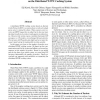Free Online Productivity Tools
i2Speak
i2Symbol
i2OCR
iTex2Img
iWeb2Print
iWeb2Shot
i2Type
iPdf2Split
iPdf2Merge
i2Bopomofo
i2Arabic
i2Style
i2Image
i2PDF
iLatex2Rtf
Sci2ools
128
click to vote
ICPPW
1999
IEEE
1999
IEEE
An Analysis of the Number of ICP Packets on the Distributed WWW Caching System
A distributed WWW caching system based on Internet Cache Protocol (ICP) is a system where a cache of a single proxy server is shared by others. When a proxy server receives an HTTP request for an object but it does not store the object locally in its cache, it sends queries to other proxies. However, the system causes a problem that many ICP messages, i.e., IP packets, are exchanged between proxies. The increase of ICP packets puts high load on a router because it must look up its routing table to relay a packet. In this paper, we focus on the number of packets on a distributed WWW caching system. We figure out the communication model of the system and influence of several parameters on the number of packets. Based on our model and the log data of an actual system, we reveal that ICP increases substantially the number of packets. Finally we conclude our argument with guidelines on organizing the distributed WWW caching system.
Distributed And Parallel Computing | Distributed Www | ICPPW 1999 | Proxy Server | WWW Caching System |
Related Content
| Added | 03 Aug 2010 |
| Updated | 03 Aug 2010 |
| Type | Conference |
| Year | 1999 |
| Where | ICPPW |
| Authors | Eiji Kawai, Ken-ichi Chinen, Suguru Yamaguchi, Hideki Sunahara |
Comments (0)

